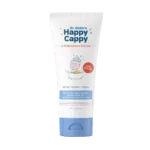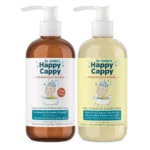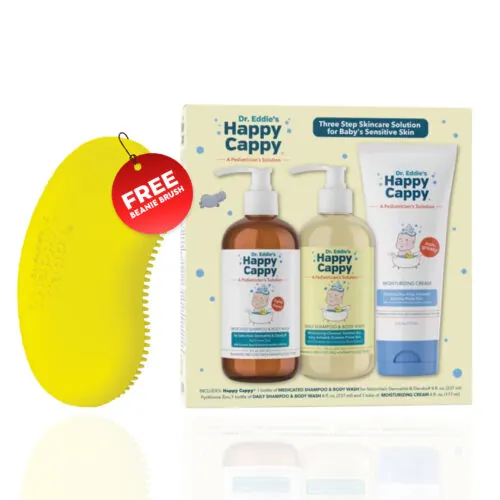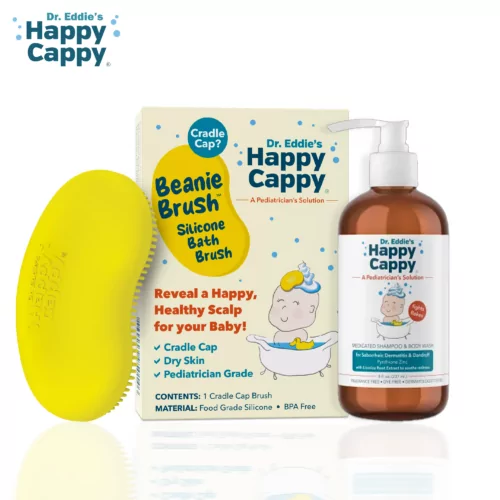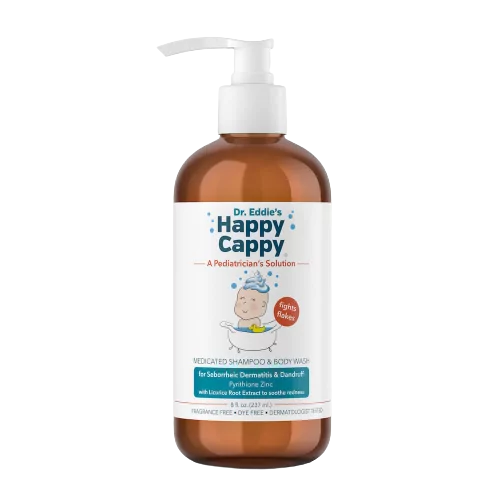
Baby eczema is a very common skin condition characterized by red, itchy, dry, and cracked skin mostly on the face, arms, and legs. According to the American Academy of Dermatology Association, eczema affects around 25% of children. And around 60% of people develop it before their first birthday.
What Does Baby Eczema Look Like?
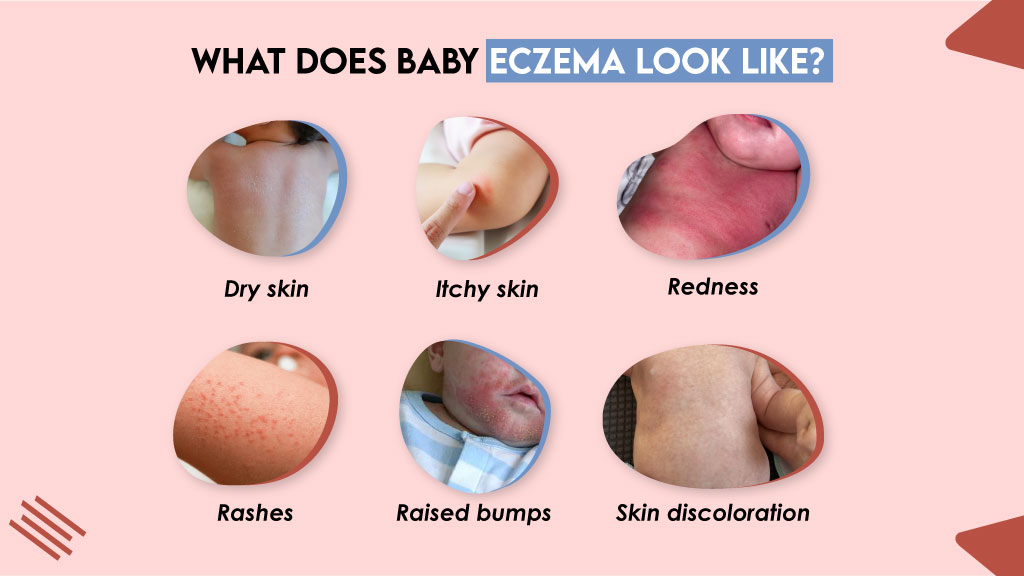
Baby eczema can cause the following symptoms:
- Dry skin
- Itchy skin
- Redness
- Rashes
- Raised bumps
- Skin discoloration
While baby eczema isn’t particularly dangerous, it is very uncomfortable and should therefore be handled in the most effective way possible as soon as possible.
Baby eczema is not the easiest to treat, but making lifestyle changes can help.
What Causes Baby Eczema?
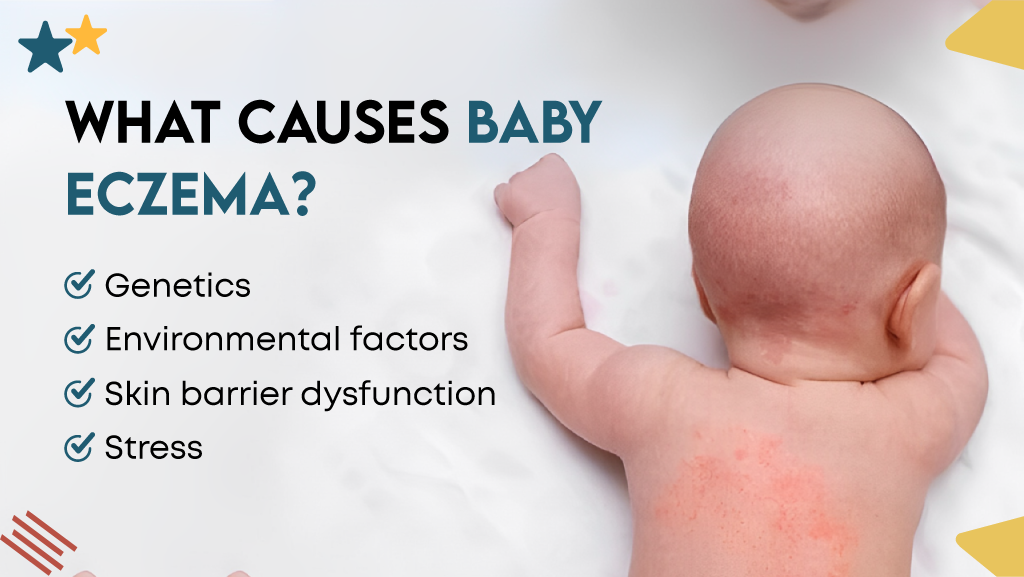
There is no specific cause for eczema. It is believed to be caused by a combination of factors such as
- Genetics
- Environmental factors
- Skin barrier dysfunction
- Stress
People who have a family history of eczema, asthma, hay fever, and allergies are more likely to develop eczema. When there is an issue with the skin barrier, the skin is unable to retain moisture and protect it against outside irritants and allergens.
This makes the skin sensitive and prone to dryness, itching, and irritation.
Baby Eczema Treatment
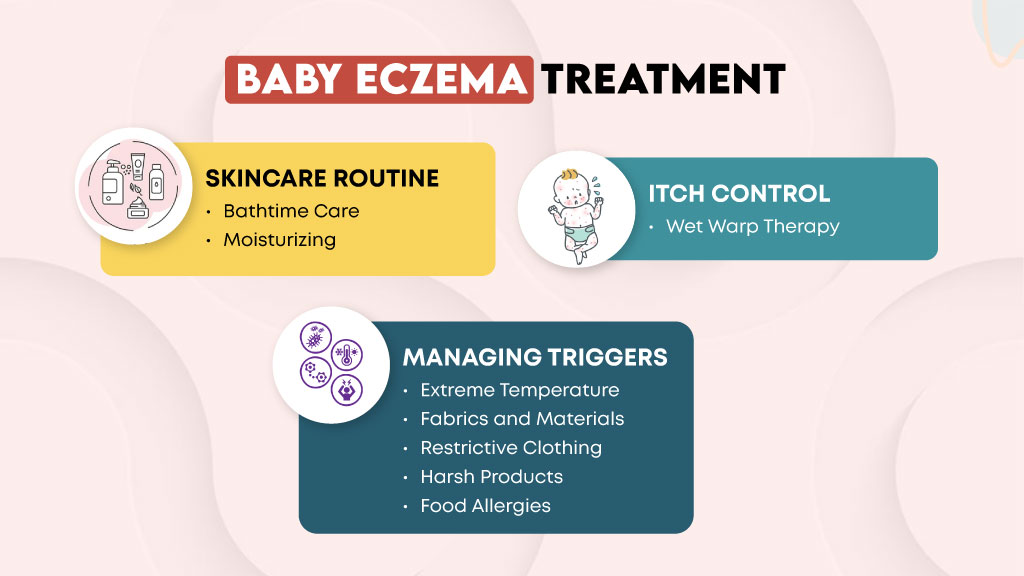
There is no cure for baby eczema, but there are a number of effective treatments that relieve symptoms and prevent future eczema flare-ups. Most cases are improved by sticking to a treatment routine and the passage of time. However, it is important to see a doctor if your baby’s eczema is not cleared or improved with at-home treatments.
Treating baby eczema has three main aspects: skin care, itch control, and managing triggers. These three aspects work in tandem to relieve symptoms, prevent worsening of symptoms, and reduce flare-up frequency.
Skincare Routine
Skincare is key when it comes to treating baby eczema. The right skincare routine can help restore your baby’s skin barrier to fight against future flare-ups and relieve existing itching, irritation, and redness.
Bathtime Care
The first step in an effective skincare routine is a daily bath.
- Bathe your baby every day for 15 minutes or less using warm water.
- Take care not to make the water too hot or too cold, as temperature can be a trigger.
- Use a gentle baby eczema shampoo and body wash in place of soap or other harsh cleaners.
- Fully rinse away all suds.
- Gently pat your baby dry with a soft towel, taking care not to rub the skin.
Try an eczema shampoo that is gentle on baby’s skin and helps soothe itching, irritation, and redness that can be found with eczema. Happy Cappy Daily Shampoo and Body Wash is a great option to choose from as it is specially formulated for baby’s sensitive eczema-prone skin.
Moisturizing
The second crucial step in a good baby eczema skincare routine is moisturizing.
- Immediately apply a cream or emollient after the bath to seal in moisture and protect the skin from irritants.
- Moisturize the baby’s skin at least twice daily.
- If the baby’s skin becomes dry more often, increase the use of moisturizer.
- Look for eczema cream that is
-
- Fragrance and Dye Free
- Dermatologist or clinically tested
- Includes Licorice Root Extract
- Uses Glycerin (same as Glycerol) as an ingredient
- Paraben and sulfate-free
If you are looking for an eczema cream to moisturize your baby’s skin try Happy Cappy’s Moisturizing Cream for Eczema it is infused with natural ingredients like glycerin and licorice root extract which helps restore the skin’s natural barrier and soothes itching and irritation.
Itch Control
Baby eczema is often very itchy, causing lots of discomfort. Unfortunately, allowing your baby to scratch the eczema rash will only worsen the itch and can further irritate the skin or cause an infection.
A key step to controlling itching is
- to keep your baby’s nails clipped
- The best time to trim nails is right after a bath, as they will be soft from the water
- You can also prevent itching by placing cotton mittens on your baby’s hands during the night, nap time, or when you’re not watching.
If the baby is still itching after following the steps advised in the section above on “skin care,” then you should consult your doctor. They may prescribe antihistamines, and topical steroid medications to relieve itching.
Wet Wrap Therapy
If your baby is experiencing intense itching, especially during the night then consult their pediatrician about wet wrap therapy. This can help soothe and relieve itching during the night and help the baby sleep.
In wet wrap therapy, moisturizer and medication is applied to the affected area, and is then covered with a damp cloth followed by soft cotton clothing. Make sure never to try this before consulting a doctor.
Managing Triggers
Baby eczema is often brought on or worsened by triggers. Triggers are environmental factors that can induce an eczema flare-up and should, therefore, be avoided. Some common triggers are:
Extreme Temperature
Both extreme hot and extreme cold can trigger eczema, as can dry air. Use a humidifier to keep the air moist and avoid exposure to extreme temperatures.
Fabrics and Materials
Some materials like polyester, wool, or other scratchy fabrics can cause irritation. Choose soft cotton clothing, bedding, and towels instead.
Restrictive Clothing
Clothing that is too tight can cause friction to build up between the skin and the material, leading to skin irritation.
Harsh Products
Household products like soaps with scent and color, scented laundry detergent, scented dryer sheets, and creams with flowery or fruity scents and beautiful colors can be too harsh for sensitive young skin. Choose gentle, fragrance-free products that are made for use on eczema-prone skin.
Food Allergies
Food allergies can occasionally trigger baby eczema. In some cases, speaking with your child’s doctor and looking for allergies may be indicated.
Choosing The Right Products For Eczema
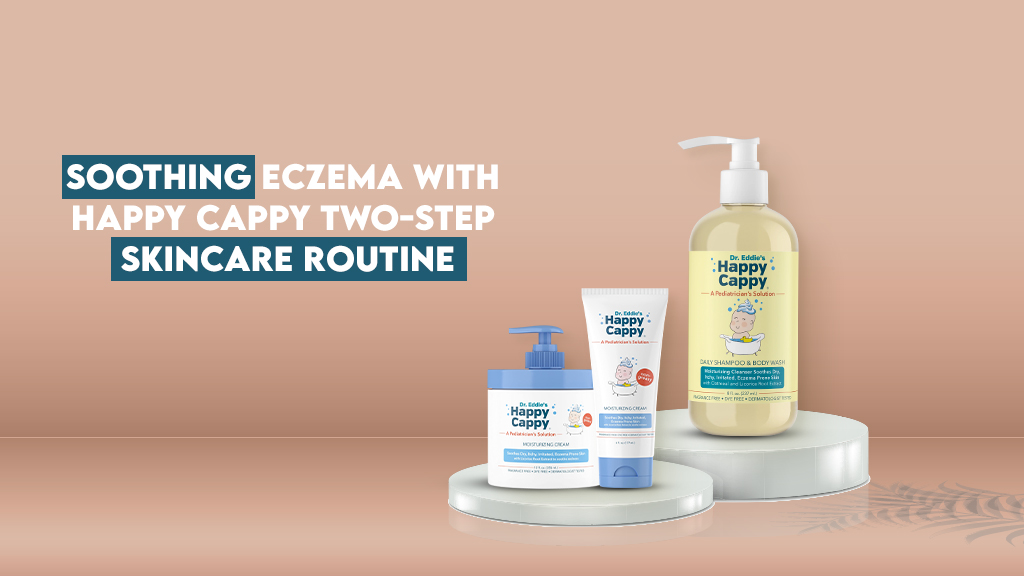
A common baby eczema trigger is soap. The vast majority of soaps and shampoos on the market are very basic, with a pH of 9 to 10. The ideal skin pH is acidic, between 4 and 6. Many commonly used products available in the market can create an unnatural acidity to the skin that could cause flare-ups.
Learn more about how acidification can help relieve eczema in this blog.
Dr. Eddie’s Happy Cappy Daily Shampoo and Body Wash is a body wash and shampoo for babies with eczema-prone skin. Developed by a licensed pediatrician, this gentle, non-soap cleanser has a low pH and is hypoallergenic and fragrance-free. Use Happy Cappy Daily Shampoo and Body Wash, a safe eczema body wash for kids, daily to smooth and soothe your young one’s dry, itchy, and irritated skin.
FAQs
How can I cure my baby’s eczema?
There is no permanent cure for eczema, as it is a chronic skin condition. This means it can show up again anytime in the form of an eczema flare-up. But there are certain things you can do to reduce its recurrence.
1 Keep the affected area clean with the help of a gentle daily moisturizer.
2 Moisturize the skin at least twice daily with an eczema cream.
3 If your eczema is caused by certain allergens or irritants, try avoiding them.
4 In severe cases of eczema, consult a dermatologist, who may prescribe the use of OTC medications.
Does eczema spread in babies?
Eczema is not contagious and can not spread to other babies by touching or playing with the affected one. However, if your baby is experiencing eczema and proper care and attention are not provided, then it can spread to other parts of the body.
How often can I wash my baby with eczema?
Washing the affected area and bathing the baby is good for the baby’s skin if they are experiencing eczema. However, excessive washing can strip away oil from the skin, making it dry and worsening the condition. So don’t bathe the baby more than once daily.
Is baby eczema permanent?
Eczema is a chronic skin condition. This means it may disappear once proper treatment and care is provided, but there are chances it may show up again later in their life.
The phase when the itching, redness, and irritation associated with eczema are relieved is known as remission. When these symptoms show up again, it is called an eczema flare-up.
Will baby eczema leave scars on my baby’s skin?
Eczema usually does not cause scaring. However, itching and scratching the area can cause rashes and scars on the skin. These scars usually disappear with proper care and treatment once the itching and irritation associated with eczema are relieved.

